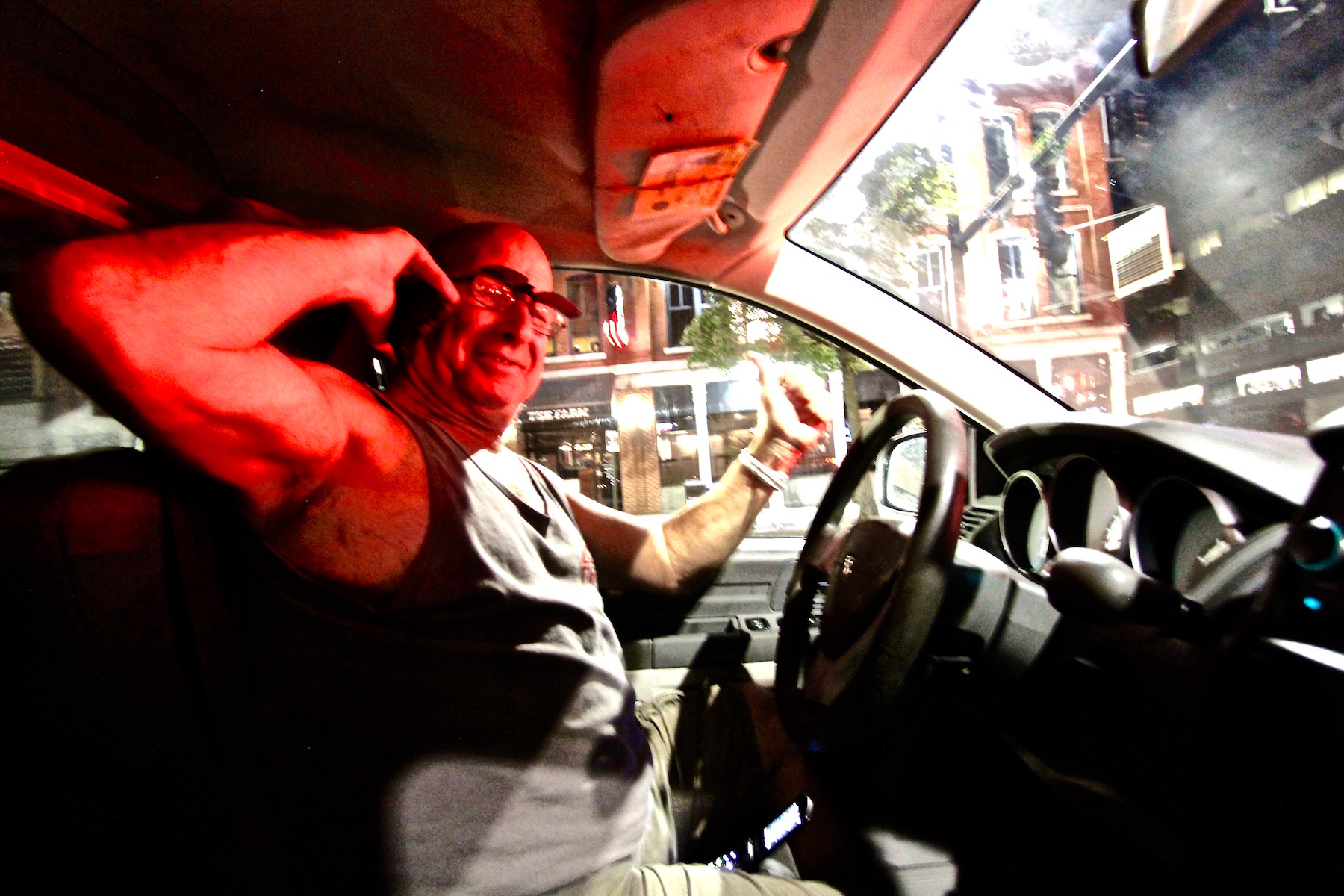
 It was my deferred date with destiny – Louie Applebaum, longtime Queen City cabbie, had offered me a tour of the “real Manchester” sometime. It was supposed to happen in the summer, but I had to take a raincheck after he got a fare he couldn’t refuse: Someone needed a ride to Boston.
It was my deferred date with destiny – Louie Applebaum, longtime Queen City cabbie, had offered me a tour of the “real Manchester” sometime. It was supposed to happen in the summer, but I had to take a raincheck after he got a fare he couldn’t refuse: Someone needed a ride to Boston.
Summer had just shifted to autumn, and it was finally time for our joy ride.
We met up at Dunkin’s on Elm Street and off we went. An unexpected voice from the backseat said “hello,” someone who needed a lift to the social club, and Louie is the master at maximizing his fares.
After a quick drop-off, the tour began. Louie starts filling me in on the city’s spotty public transportation history like it was a previous conversation we were finally getting back to.
“I’ve never been a proponent of the cab being something lucrative. The cab is about helping people get from point A to Point B, whether for medical reasons or work reasons. There’s a lot of reasons why people take cabs, and there’s more people now than ever in Manchester taking them, because there’s endless people who never get their license,” he says. “But no one becomes a baron driving a cab.”
Louie should know. He’s been at it for 26 years, and he loves his job. He’ll tell you he’s seen it all, and then some.
I ask if he can say what his most frequent ride request is, expecting it to be a lift to Market Basket, or something like that.
“That guy went to the social club. A group I had earlier were from Russia, Israel, Croatia – they were going to the mall from the Radisson. What a melting pot our city is! They wanted to know some of the places to see,” he says.
“Every day’s a new day,” I pipe in, and he corrects me. “Every call is a new day.”
“This is Manchester. This…,” he pauses for effect, “…is Manchester,” uttered with more reverence than a cab full of nuns. He lingers at the stop sign at Chestnut and Lowell before proceeding slowly between the twin spires of Grace Episcopal and St. Joseph’s that rise above the dusk of a muted September sky.

“First openly gay married priest, Gene Robinson. Grace Episcopal Church. This is Manchester. Saint Joe’s right over here, the beautiful chapel. Every corner is churches. Does this look like a drug-invested den here? Does this look like a drug-invested den, I ask you, my friend?”
Turns out it wasn’t a rhetorical question. Louie’s banter is one-part tour guide, one part historian, and one part New York City cab driver who got lost and ended up in New Hampshire.
As we hang a right onto Union Street, Louie mentions how programs associated with Catholic Charities have helped so many immigrants and refugees get a fresh start in our city, then points at the Boys and Girls Club, with the colorful sculpture on the building.
“Adam Sandler donated one-million dollars to them, the Manchester Boys and Girls Club. There’s another church. The whole community is churches. See my friend? The whole community. Places of worship. Another one, my friend. Over there, a park. They’re playing soccer,” he says, sticking his hand out his open window gesturing toward the gully that is Bronstein Park at Union and Hanover.
“I ask you again, does this look like a drug-infested den? The Flats,” says Louie, passing a building that not so long ago housed a drug recovery program. Now, it’s upscale micro-apartments for the influx of young college grads demographers expect to be drawn to Manchester’s magnetic millyard tech hub.
“Saint Casimir Catholic School. Saint Anne’s. The whole town is steeples,” he says, his tone reminds me of Vizzini from The Princess Bride, except the word “inconceivable,” is only implied.
“Angie’s Place helps unwed mothers. There are more services in Manchester to help people,” he says, slowing to a near-stop when he sees one of his regulars across the street. “Hey John! How you doing?” Louie hollers out his window, genuinely interested in the answer. John tells him not to work too hard. “All-right man, have a good night.”
In the Zone
He rolls along Union Street well below the speed limit, traffic passing him on the left, as he takes it all in and filters it back out for his tourist of the night.
“This is that part of Manchester they call “the zone” right here, he says.
A part of town most people avoid, he says. People who choose to draw conclusions about the city based on what they think, not on fact; not on the kind of information guys like Louie have learned, by heart.
“They like the words insular. They like the word myopic. They like to get in their cars, go to work, and go home, and never see what this community is. I see what this community is. Everything going on here’s good. There’s a bike shop over there,” he says, as we pass Queen City Bike Collective. “If you have money, you can go to Nault’s, or you can have your tire changed for $3 right there.”
He makes note of a barber shop and a Spanish restaurant. It all feels like home to Louie, who inherited his hometown pride from his parents.
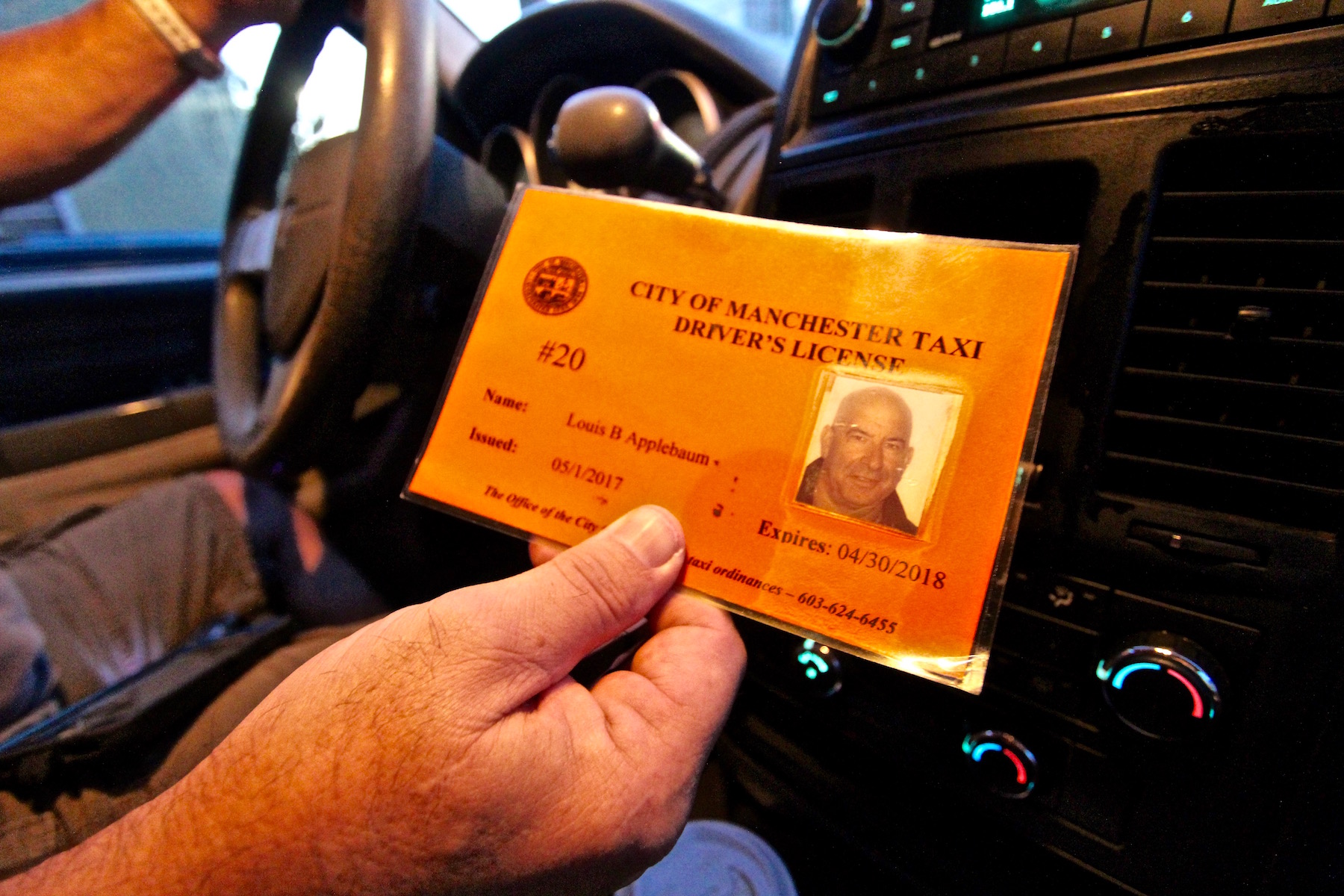
“My mother grew up right there, 350 Union Street,” says Louie. “She passed away in June, the baby of eight children. She worked at the grocery store before marrying my father. Their wedding anniversary was June 7. She was born here. Her mother and father came from Greece. They migrated here, but my mother was born here. Carol, I don’t see it. I don’t see all the negativity. Maybe I have blinders to it. Maybe because I drive a cab and I see it in a different vein. Maybe I don’t see it. I don’t know,” he says as we turn onto Merrimack Street. “These parks are beautiful. There’s a family over there in the park,” he says, as we pass Veterans Park and turn right onto Elm Street, heading toward McGarvey’s.
“Look at the cleanliness here,” he says as we pass a cop car parked on Elm. “And these are the guys who make all the difference. They’re presence diffuses 60 percent of the problems that would transpire – just by that car being there changes a lot of people’s minds. And they’re out here in this community, shaking hands, riding their bikes – they know the population, they know which situations are serious and when to keep moving. And we didn’t necessarily have that 10 years ago, they weren’t so concerned with community relations – and that’s my opinion. That’s just my opinion.”
Louie reflects on the state of police relations around the country – it’s unsettling. A lot of people with weapons. A lot of people being killed by cops. “A lot of problems in cities around the country with law enforcement, but Manchester, New Hampshire, is not one of those places – and that should be noted,” he says.
“This is beautiful. We have a lot of diversity – we have the Hungarian place, and the Saigon Market. We need more diversity. And we need people from these other countries to get more civically involved – we need them in the police department and the fire department. We need them in the schools. We need them civically everywhere, and I believe they’re bridging the gap for that.”
Ya snooze, ya lose
Look how beautiful this building is, Murphy’s Taproom. People sitting outside after working hard all day, coming down here and having a bite to eat,” he says as we cruise past the taproom, toward Market Basket. “This is Ted Gatsas’ doing. He put this here. Think about all the jobs it’s created. All the convenience it’s created. All smart moves, to help the people of Manchester.”
He appreciates the landscaping of the supermarket lot, and the transport zone on the side designed for cab drivers to pick people up who need to lug groceries home. Louie is answering a call for two people heading home from Market Basket when he spies another guy waiting on a bench. He asks him if he needs a ride. The man tells him he’s already called another cab company.
“I can take you right now, sir,” Louie says. “I got room. Jump on the other side. Come on in.” Louie helps everyone load their bags into the hatchback.
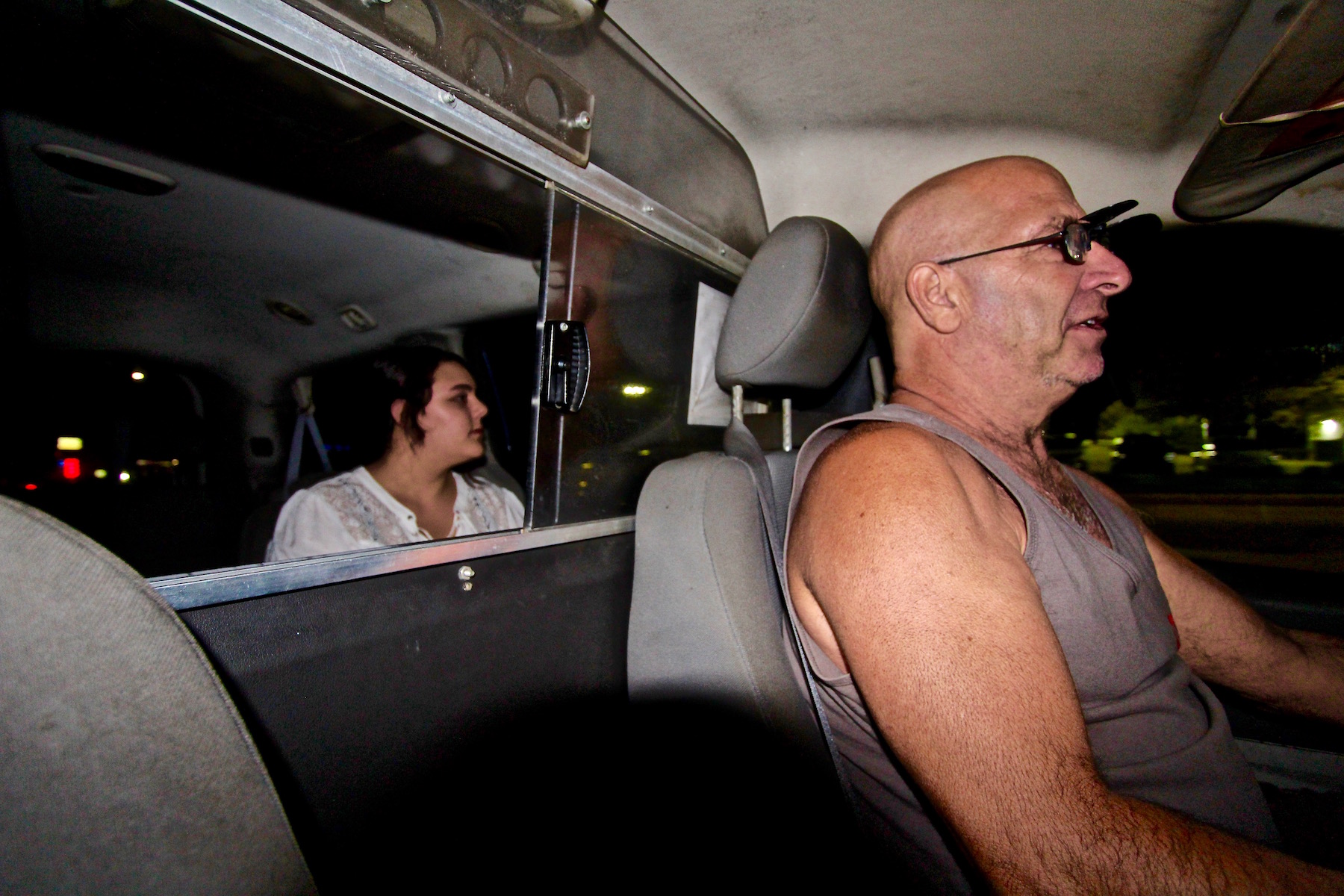
The other cab company driver pulls up as Louie is pulling away, chuckling. “Ya snooze, ya lose,” he says. He asks the man if he’s a regular cab rider. “Not always, but today my feet are killing me.”
Louie is in his element. He makes small talk as everyone settles in for the short ride. Louie lets his dispatcher know where his fares are heading. It’s cash only for Queen City Taxi. One fare will be $3.40, the other, $4.
He says he doesn’t feel he’s in competition with the technology-driven Uber and Lyft.
“I’m glad for those services. They’re getting people home safely,” Louie says. “I can do four jobs to their one. They’re still putting into their GPS looking for Elm Street. It’s a whole different business. I’m glad they’re here to bring people home. This is the way people with their smart phones, and their parents putting money in their accounts, get around. These young people in their 20s, they’re new to the world and maybe they look at a cab as being inferior, where the cab has been around a lot longer and knows their way a lot better.”
His dispatcher sends him to Amherst Street.
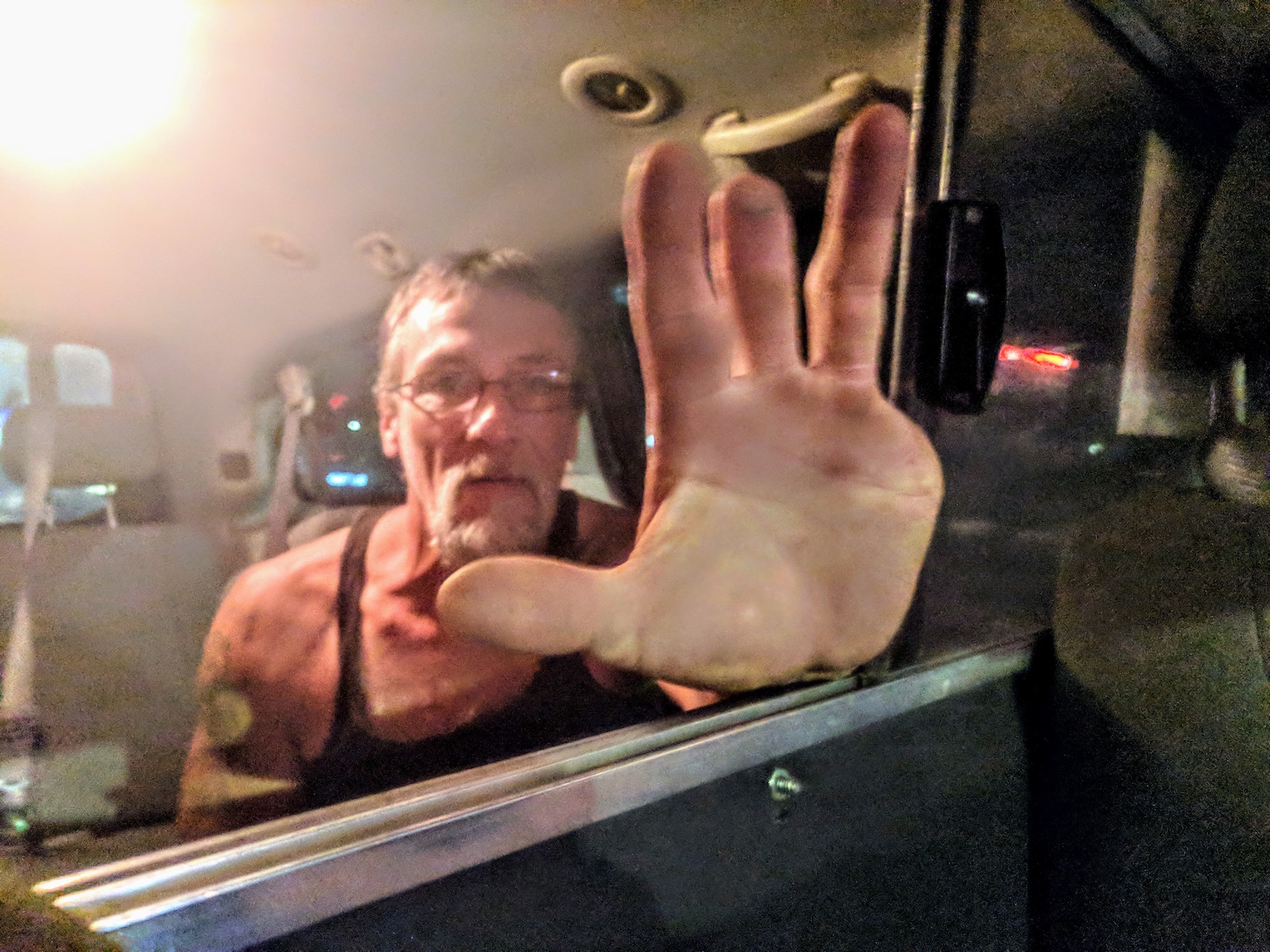
“That’s what they’re aiming for, Saturday nights,” he says of ride sharing services. “From what little I understand of them, they want the party crowd. They’re not going to grocery stores or hospitals. They’re picking and choosing. They call it a side hustle. This is not my side hustle. I work four in the afternoon until 4 in the morning, Friday, Saturday, Monday and Tuesday,” says Louie. “I’m glad they’re here. They play a part, because we can only have so many metered cabs in the city, for insurance reasons. It’s very hard to find people to work 12-hour shifts. There are more jobs than people.”
Queen City Taxi is the largest cab company in the city, all the drivers have to go to Concord to get updates on their driving record and criminal record. The public is entitled to know that we’re held to certain standards,” he says.
He became a cab driver based on a bit of bad luck – which turned out to have a silver lining: He found his calling.
“I was broke in Las Vegas. I had a friend whose brother owned a cab company called Arrow Taxi, and I said to her, if you buy me a ticket, I’ll come work for your brother’s cab company. And so I came back to Manchester in August of ’91. She was nice enough to buy me a ticket, and I’ve been driving a cab ever since.”
Stopped at a traffic light on Maple and Hanover, Louie grabs a couple bucks from the console and hands them out the window to a man with a walker and a sign. Despite police asking the public not to give to panhandlers, Louie sometimes feels compelled to give.
“I consider him a person in need, and two dollars isn’t going to change my world. I believe in karma and in being good to my fellow man. I can’t do that for every person I see, but I try to be nice to people,” he says, stopping to pick up his next fare on Amherst Street “This is a common call. She’s going to work at Burger King on South Willow. She takes the cab all the time. She comes out slow,” he says laying on the horn.”
Heather says she’s been a night manager for almost a year, and takes a cab both ways, 7 bucks a ride. She doesn’t have a license and says she’s tried Uber, but prefers the cab.
“It’d be nice if the buses ran later,” says Louie. “I wish they worked later, there’s a need, and it wouldn’t hinder our business.”
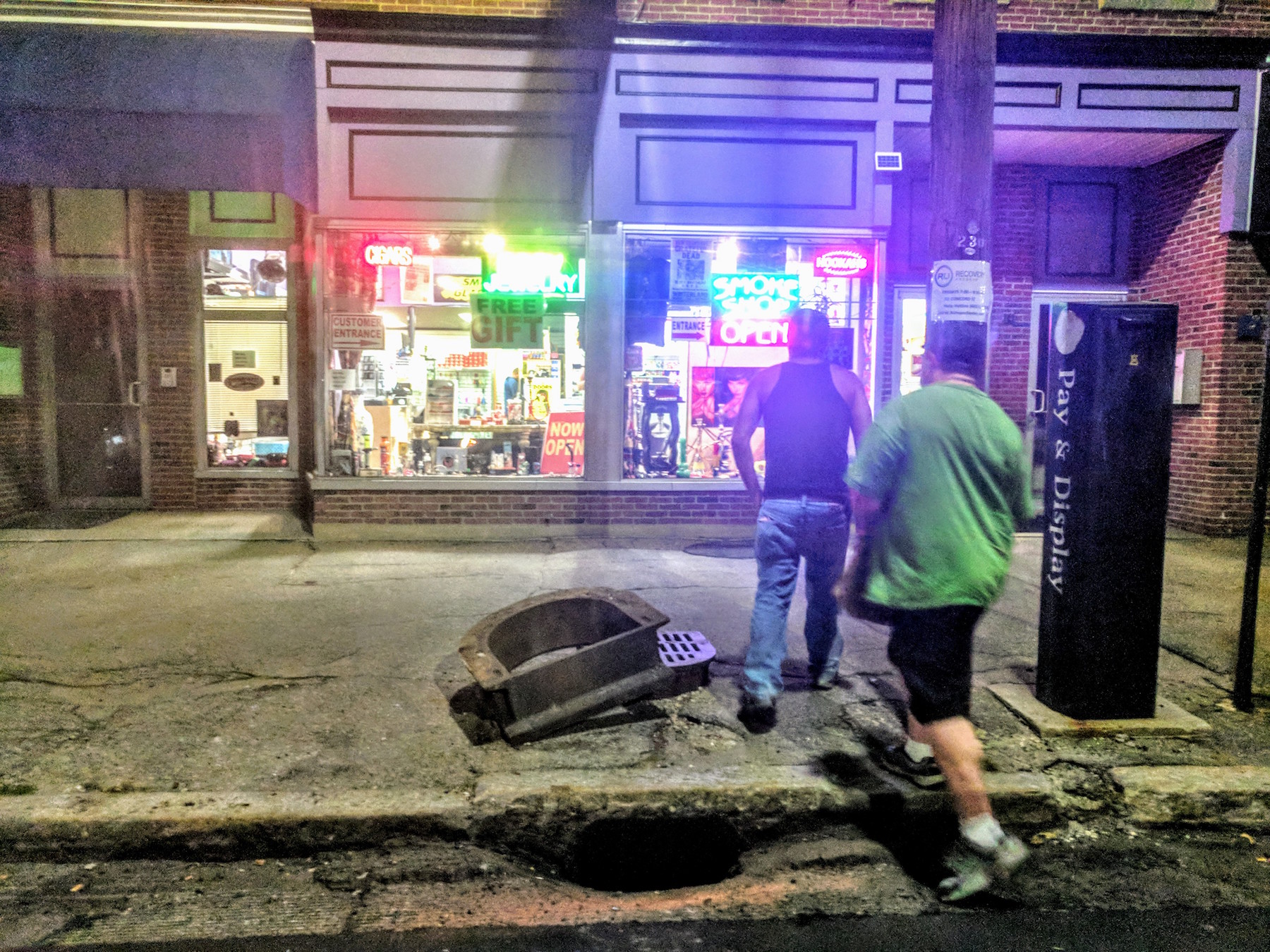
Heather says she takes the bus sometimes, if her shift starts early enough. The last bus out of Veteran’s Park is 6 p.m. Louie stops to pick up another fare, Lexi, who’s heading to Walmart to grocery shop. She just moved to the city from Berlin. She says she’s a people person and city life suits her better. She enjoys the sights and sounds of Elm Street at night, a big contrast from the North Country.
Lexi says she had no trouble finding a job – she had one lined up before she arrived. “There are so many opportunities here,” she says.
“The only ones not working are the ones who don’t want to,” says Louie, like a one-man Chamber of Commerce on wheels. He can’t say enough positive things about the city services, or the eateries – and not just the downtown restaurants, but also the fast food joints on South Willow. “These places are very, very busy,” he says.
Tattoos, melting pots and redemption
After Walmart, he has a call from La Caretta, a regular named Andy who Louie picks up three or four times a week for trips out to dinner and back. After that, Louie heads back to South Willow Street to fetch two out-of-town laborers who want to get from their hotel to a tattoo place on Elm Street, to commemorate their trip.
One of the guys, Eben, is going to get a no-smoking sign tattooed in the web between his thumb and index finger, . “I’m giving myself a 50th birthday present. I’m quitting smoking and this will remind me not to smoke no more,” he says, showing off his eight surviving digits – he lost two to construction jobs over the years.
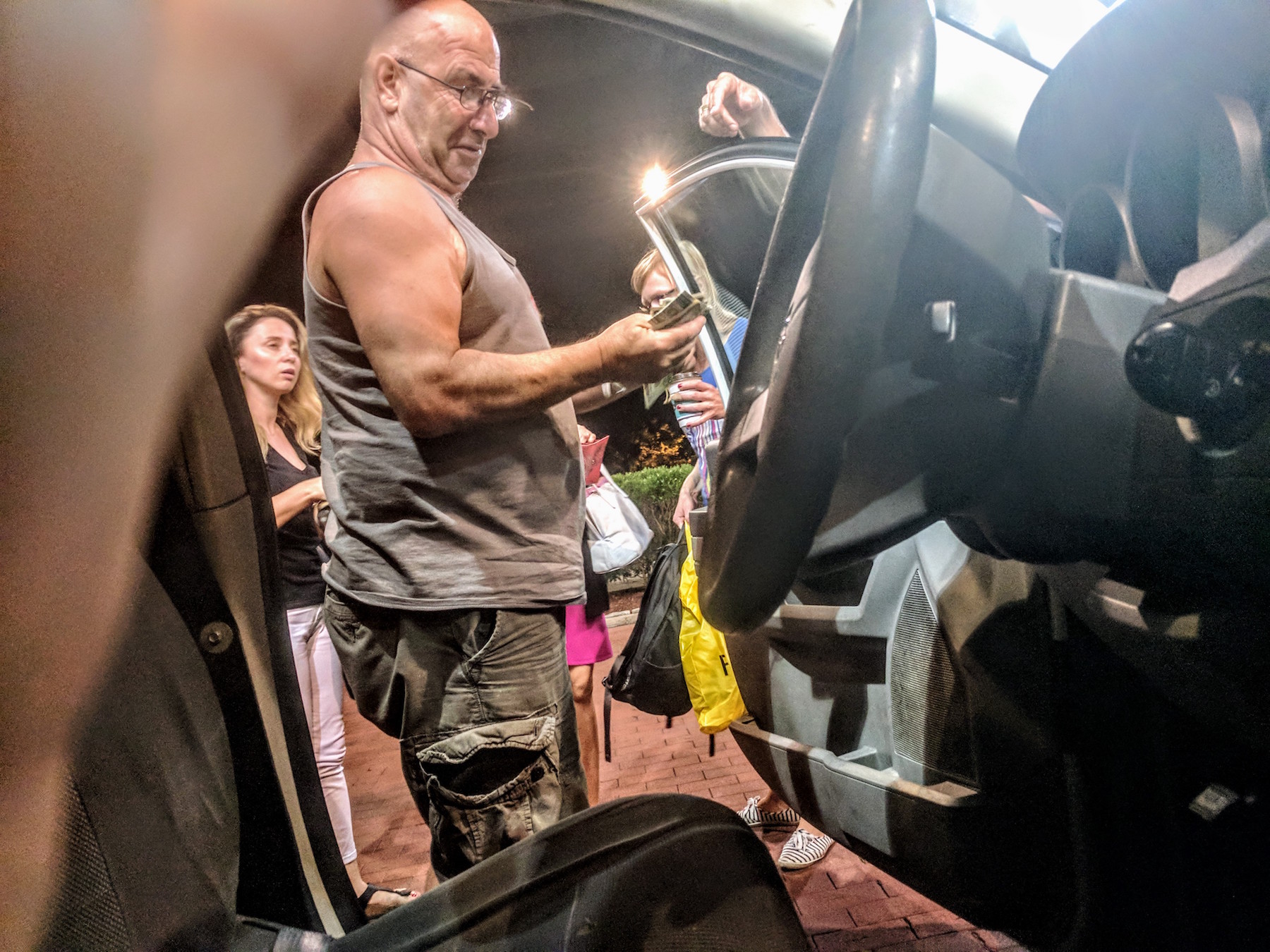
Another call comes in – Louie’s heading back to the Mall of New Hampshire to retrieve the party of four international visitors who are done shopping and ready to head back to the Radisson. It will be a tight fit, but Louie will make it work.
“Whoever knew Manchester would be such a melting pot,” says Louie.
He explains that, to his way of thinking, cabs are an essential part of city life – working around the clock for anyone who needs a cheap ride, from here to there and back again.
“It’s not that hard to get a cab, but it’s hard to get a good cab driver,” says Louie, one of the good ones, for sure.
He steps out of the cab to assist everyone from the back seats, and collects his cash.
“A cab driver is like an ambassador to the city he lives in, that’s how I look at it, to let them know about the stores, the hotels, the sights. Sometimes they’re interested in the history, like these folks from overseas. I told them Adam Sandler is our claim to fame,” says Louie, which leads to an extended discussion of Sandler and New Hampshire’s other famous comics – Sarah Silverman and the Myers brothers.
In between it all the conversation bounces from philosophy to politics to Louie’s past. When he’s not working, Louie says he’s just a guy who found some redemption behind the wheel of a taxi cab. He’s made his mistakes, and is grateful to drive around the city that seems to love him back.
His own struggles gave him empathy, and taught him more than a thing or two about human compassion.
“I never thought I’d be driving a cab for 26 years. Maybe by driving a cab and helping others, it gave me a chance for people who might have thought ill of me to see that I work hard, like anyone else, and maybe… maybe I’m not such a bad guy.”








